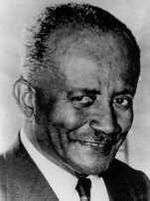West Indies federal elections, 1958
| | |||||||||||||||||||||||||||||
| |||||||||||||||||||||||||||||
| |||||||||||||||||||||||||||||
| |||||||||||||||||||||||||||||
Federal elections were held in the West Indies Federation for the first and only time on 25 March 1958. The result was a victory for the West Indies Federal Labour Party, which won 25 of the 45 seats in the House of Representatives.
Electoral system
Candidates were nominated on 28 February in all islands except Trinidad and Tobago, where candidates were nominated on 3 March.
Campaign
In preparation for the elections, two Federation-wide parties were organised as confederations of local political parties. Both were organised by Jamaican politicians: the West Indies Federal Labour Party by Norman Manley, and the Democratic Labour Party by Alexander Bustamante. In broad terms, the WIFLP consisted of the urban-based parties throughout the Federation, while the DLP consisted of the rural-based parties. A small third party, the Federal Democratic Party, was founded in November 1957 by a group of Trinidadians.
The platforms for the two major parties were similar in many respects. Both advocated maintaining and strengthening ties with the United Kingdom, United States, and Canada (countries with which the islands had strong cultural and economic links); encouraging and expanding tourism; working to bring British Guiana and British Honduras into the Federation and to obtain loans, financial aid, and technical assistance. Despite these similarities, there were differences. The WIFLP had advocated the encouragement of agriculture while the DLP had promised a climate favourable to both private industry and labour, development of human and economic resources. The WIFLP promised to encourage the Bahamas (in addition to British Guiana and British Honduras) to join the Federation, whereas the DLP did not. The WIFLP also campaigned to establish a central bank for the extension of credit resources and advocated a democratic socialist society and full internal self-government for all the unit territories, whilst avoiding the issues of freedom of movement and a customs union. The DLP said nothing about full internal self-government, attacked socialism, wished to avoid high taxation (via loans and technical aid) and emphasized West Indian unity, freedom of worship and speech, and encouragement of trade unions.
Results
The WIFLP won the election with 25 seats (plus the Barbados National Party, which supported it), whilst the DLP claimed 19 seats. The bulk of the WIFLP seats came from the smaller islands while the DLP carried the majority in Jamaica and Trinidad and Tobago. WIFLP leader Grantley Adams of Barbados became Prime Minister.
| Party | Votes | % | Seats |
|---|---|---|---|
| West Indies Federal Labour Party | 25 | ||
| Democratic Labour Party | 19 | ||
| Barbados National Party | 1 | ||
| Total | 45 |
By island
| Islands | BNP | DLP | WIFLP | Total |
|---|---|---|---|---|
| Antigua and Barbuda | – | 0 | 2 | 2 |
| Barbados | 1 | 0 | 4 | 5 |
| Dominica | – | 0 | 2 | 2 |
| Grenada | – | 0 | 2 | 2 |
| Jamaica (incl. Cayman Islands & Turks & Caicos Islands) | – | 11 | 6 | 17 |
| Montserrat | – | 0 | 1 | 1 |
| Saint Kitts-Nevis-Anguilla | – | 0 | 2 | 2 |
| Saint Lucia | – | 0 | 2 | 2 |
| Saint Vincent and the Grenadines | – | 0 | 2 | 2 |
| Trinidad and Tobago | – | 6 | 4 | 10 |
| Total | 1 | 19 | 25 | 45 |
Aftermath
Following the elections, Grantley Herbert Adams of the WIFLP became Prime Minister following a 23–21 vote in the House (the Grenada members, while allied with WIFLP, supported the DLP). However, his selection was indicative of the problems the Federation would face; The expected leader of the WIFLP was Norman Manley, Premier of Jamaica, and the next logical choice was Eric Williams, Premier of Trinidad and Tobago. However, neither had contested the federal elections, preferring to remain in control of their respective island power bases, as were not eligible. This suggested that the leaders of the two most important provinces did not see the federation as viable. Similarly, Alexander Bustamante, the Jamaican founder of the DLP, also declined to contest the federal election, leaving the party leadership to the Trinidadian Ashford Sinanan. The absence of the leading Jamaican politicians from any role at the federal level was to undermine the federation's unity.
References
- The National Archives (United Kingdom): File CO 1031/2628: Elections in Federation of West Indies.
- West Indies Federal Archives Centre: File FWI-PM-GA-115: Issue of Writs By Governor-General for First Federal Elections 1958.
- The Growth of the Modern West Indies. Gordon K. Lewis, Ian Randle Publishers, 2004.
- Caribbean Elections - West Indies Federation
